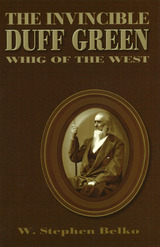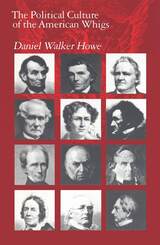3 books about Whig Party (U.S.)

The Invincible Duff Green
Whig of the West
W. Stephen Belko
University of Missouri Press, 2006
He made a name for himself in the Missouri territory as a land speculator, entrepreneur, lawyer, militia officer, politician, and newspaper editor. He went on to take part in many of the events that shaped the young republic, and his name became a household word. But Duff Green has not found his rightful place in history—until now. W. Stephen Belko has written the first full-scale political investigation of this important figure, examining Green’s fundamental role in the politics, society, and economy of Jacksonian America.
Duff Green emerged on the national stage when he became editor of the United States Telegraph, an organizer of the fledgling Democratic Party, and one of Andrew Jackson’s chief advisers. He broke bitterly with Jackson over his feud with Vice President John C. Calhoun, then later found a place as a diplomat in John Tyler’s administration and emerged as a key figure in the popularization of Manifest Destiny and the annexation of Texas. Green also played a major role in the transportation revolution as a developer of canal and railroad projects.
Belko presents a balanced appraisal of Green’s career, particularly from 1815 to 1850, delving into his personality to tease out the motivations for his pursuit of such wide-ranging ventures. Drawing on a wealth of previously unexploited primary sources, he not only chronicles Green’s labyrinthine career but also illuminates Green’s rise in the Democratic Party; his role in the creation and development of the Whig Party; and his considerable influence on national debates regarding slavery, nullification, the National Bank, territorial expansion, and foreign relations.
For all his influence, Green has until now been either ignored or portrayed as a Calhoun minion and proslavery sectionalist in the Fireater mold. Belko revises these assessments of Green’s role in the making of Jacksonian America, showing him to be an independent westerner who was politically moderate—even less fanatical on the slavery issue than many have supposed. Belko’s research uncovers a Duff Green who was an aggressive and buoyant person, to be sure, but a democratic man of principle who is rightly called a quintessential Jacksonian.
The story of Jacksonian America cannot be fully told without Duff Green. This long-awaited study is a compelling narrative for scholars and aficionados of political or Missouri history, offering a fresh view of his crucial contributions to the antebellum era and shedding new light on the true nature of Jacksonian democracy.
[more]

Junius And Joseph
Presidential Politics and the Assassination of the First Mormon Prophet
Robert S. Wicks & Fred R. Foister
Utah State University Press, 2005
"Junius and Joseph examines Joseph Smith's nearly forgotten [1844] presidential bid, the events leading up to his assassination on June 27, 1844, and the tangled aftermath of the tragic incident. It... establishes that Joseph Smith's murder, rather than being the deadly outcome of a spontaneous mob uprising, was in fact a carefully planned military-style execution. It is now possible to identify many of the key individuals engaged in planning his assassination as well as those who took part in the assault on Carthage jail. And furthermore, this study presents incontrovertible evidence that the effort to remove the Mormon leader from power and influence extended well beyond Hancock County [Illinois] (and included prominent Whig politicians as well as the Democratic governor of the state), thereby transforming his death from an impulsive act by local vigilantes into a political assassination sanctioned by some of the most powerful men in Illinois. The circumstances surrounding Joseph Smith's death also serve to highlight the often unrecognized truth that a full understanding of early Mormon history can be gained only when considered in the context of events taking place in American society as a whole."
[more]

The Political Culture of the American Whigs
Daniel Walker Howe
University of Chicago Press, 1984
Howe studies the American Whigs with the thoroughness so often devoted their party rivals, the Jacksonian Democrats. He shows that the Whigs were not just a temporary coalition of politicians but spokesmen for a heritage of political culture received from Anglo-American tradition and passed on, with adaptations, to the Whigs' Republican successors. He relates this culture to both the country's economic conditions and its ethnoreligious composition.
[more]
READERS
Browse our collection.
PUBLISHERS
See BiblioVault's publisher services.
STUDENT SERVICES
Files for college accessibility offices.
UChicago Accessibility Resources
home | accessibility | search | about | contact us
BiblioVault ® 2001 - 2024
The University of Chicago Press









